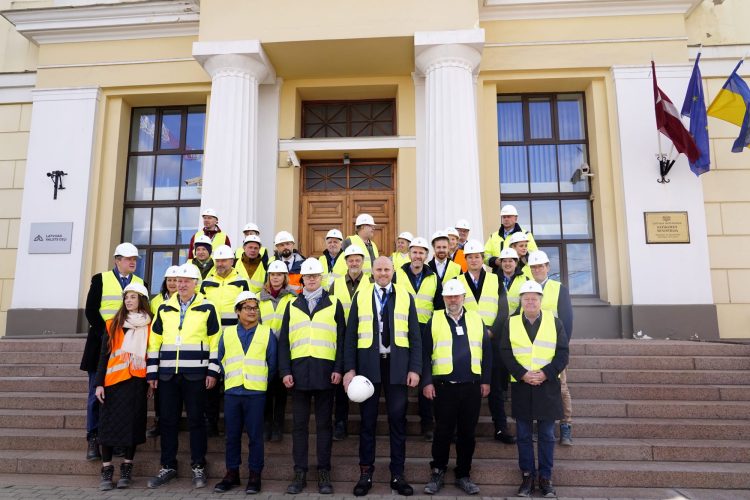Baltic Sea Region Parliamentarians Discuss Rail Baltica
Posted: 18 October 2023 | Emily Budgen | No comments yet
Baltic Sea parliamentarians met yesterday to discuss the strategic importance of Rail Baltica, as well as its connections to European cities.


On the 16th October, a group of parliamentarians from the Baltic Sea region met with Latvia’s Minister of Transport, Kaspars Briškens, and the delivery organisations of Rail Baltica. The purpose of the meeting was to gain insight into the Rail Baltica project and visit the construction site of the Rail Baltica Riga Central Hub.
Rail Baltica is one of Europe’s largest high-speed infrastructure projects, aiming to establish a modern and sustainable rail link that connects the Baltic States of Estonia, Latvia, and Lithuania with the European rail network. It is also a part of the trans-European transport corridor.
Discussions revolved around the strategic significance of the Rail Baltica project, the progress of its implementation in Latvia, and Rail Baltica’s integration into the European Union’s transportation network.
Addressing the group, Latvian Minister for Transport Kaspars Briškens emphasised the importance of Rail Baltica and the progress achieved:
“Today, Rail Baltica has transformed from a dream and vision into a project that clearly outlines the scale of its infrastructure and the ecosystem, which this new economic and security corridor will create. In Riga, one can witness one of the most large Rail Baltica construction sites, giving shape to a modern and multimodal transportation hub. Furthermore, the progress in construction and design is evident throughout the Baltic region.”
The politicians are visiting Riga to convene the first working group session of the Baltic Sea Parliamentary Conference (BSPC) on energy supply issues.
“The geopolitical situation has made it evident that the resilience and connectivity of our transportation networks are the foundation of security for all our countries. We see that parliamentarians from the Baltic Sea region share a common understanding of the challenges and the vision for their solution,” noted the Chairman of the BSPC Working Group on Energy Security, Self-sustainability, Resilience and Connectivity, and Member of the Latvian Parliament Andris Kulbergs.
“The priorities of the working group are clear – energy independence, digitalisation of the sector, and connectivity of transportation networks. Therefore, it was important for our working group to meet with the Rail Baltica team.”
Emilien Dang, the Technical Director and Board Member at Rail Baltica central coordinator RB Rail AS, presented the key elements of the Rail Baltica global project, while Kaspars Vingris, Chairman of the Board at Eiropas Dzelzceļa līnijas, introduced the progress of the project’s implementation in Latvia.
Following the visit, the parliamentarians toured one of the most complex and large Rail Baltica construction sites, where the progress already allows a visual understanding of its scale and future functionality. Guntis Āboltiņš-Āboliņš, Executive Director of the construction consortium BERERIX, provided insight into the construction progress at the Rail Baltica Riga Central Hub site. The group included representatives from Sweden, Finland, Norway, Poland, Lithuania, Estonia, Denmark, Germany, and Latvia.
Rail Baltica will be a fully electrified, double-track railway with a standard gauge of 1435mm and will be made with ERTMS (European Rail Traffic Management System) and designed to meet European standards. With a design speed of 249km/h, Rail Baltica will significantly reduce travel times between the Baltic States and major European cities. It will serve as a modern infrastructure for passenger, freight, and military movement, promoting accessibility and facilitating business, tourism, and cultural exchange. Additionally, the project will enhance the Baltic area’s position as a vital transit hub, fostering stronger trade connections and promoting regional cooperation.
More Like This
Škoda Group signs €320 million contract with Uzbekistan Railways
First test cargo train from Ukraine arrived
NRS orders additional EuroDual locomotive from ELP
Related topics
Conferences & Events, Consultancy, European Rail Traffic Management System (ERTMS), Route Development
Related organisations
Related people
Andris Kulbergs, Emilien Dang, Guntis Āboltiņš-Āboliņš, Kaspars Briškens, Kaspars Vingris







